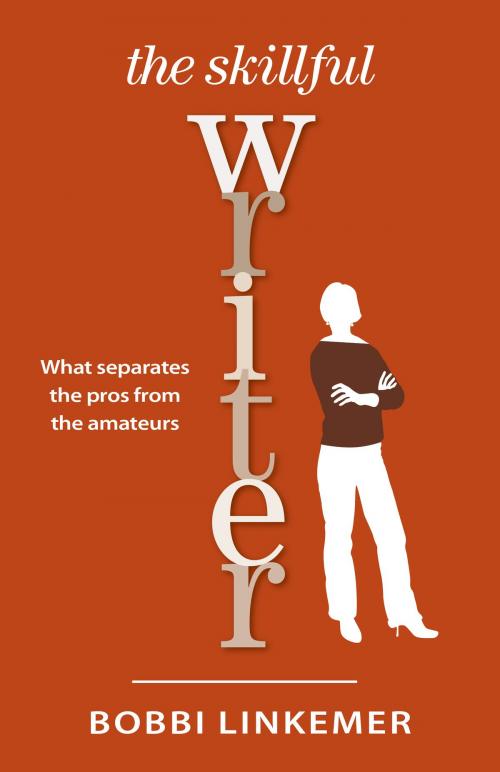The Skillful Writer
What Separates the Pros from the Amateurs
Nonfiction, Reference & Language, Language Arts, Writing & Publishing, Writing Skills, Reference| Author: | Bobbi Linkemer | ISBN: | 9780988578081 |
| Publisher: | LinkUp Publishing | Publication: | February 12, 2016 |
| Imprint: | LinkUp Publishing | Language: | English |
| Author: | Bobbi Linkemer |
| ISBN: | 9780988578081 |
| Publisher: | LinkUp Publishing |
| Publication: | February 12, 2016 |
| Imprint: | LinkUp Publishing |
| Language: | English |
A skillful writer is one who respects and continually hones his/her craft. There are as many opinions on what it takes to become a skillful writer as there are writers. Many of them are worth considering, especially when they are the opinions of seasoned, successful writers. In The Skillful Writer: What separates the pros from the amateurs, every chapter begins with a quote from a best-selling author or a well-known expert in his/her field. For example, an observation from Maya Angelou”— “You can’t use up creativity. The more you use, the more you have”—sets the stage for a chapter on creative writing. The art of discipline is addressed by Dr. Seuss, and permission to write a very messy first draft by Lawrence Block. Harper Lee shares her feelings about handling criticism, and Michael Jordan, who isn’t an author, explains a subject he knows well: how to overcome obstacles. These quotes are all inspirational, and that’s just how they are used—as inspiration for each chapter on some aspect of skillful writing. Veteran author Bobbi Linkemer brought her own interpretation of other authors’ words. When Annie Dillard, author of Bird by Bird, encouraged writers to “Give it, give it all, give it now,” Bobbi wrote, “Annie Dillard is a professional. Professionals make a mess and go back and clean it up later. I think she means, when you sit down to write, give it everything you’ve got. Don’t tidy your sentences as you go. Get in a state of flow or the zone or whatever you call it.” Here is a list of topics covered in the book. The book can be read a little at a time or straight through and the chapters in any order that appeals to the reader. 1. Alchemy: Writing Through Tough Times 2. Back to Basics: The Art of Writing 3. Consider Your Options 4. Creativity Multiplies 5. Discipline Can Be Learned 6. Don’t Hold Back 7. Don’t Waste Words 8. Eight Hours a Day 9. Explain it in Plain English 10. Give Yourself Permission 11. How to Keep Your Reader Hooked 12. If It Sounds Like Writing, Rewrite It 13. Learning to Live With Criticism 14. Learning to Write 15. Organization: The Key to Writing a Book 16. Perfection Is in the Eye of the Beholder 17. Punctuation Rules Writers Must Know 18. Read First … Then Write 19. Read Other Writers 20. Real Writers 21. Six Essential Rules Every Writer Should Follow 22. Stephen King Doesn’t Like Adverbs 23. The Desire to Write 24. The Life You Don’t Choose 25. The Magic of Talent 26. The Power of Ideas 27. The Problem With Works in Progress 28. The Right Word 29. The Secret of Good Writing 30. Why Grammar Counts 31. Will You Write or Won’t You? 32. Write for Your Ideal Reader 33. Write One True Sentence 34. Write to Make A Difference 35. Write What Disturbs You 36. Writers “Just Do It” 37. Writing: Art or Craft? In thirty-seven brief chapters, best-selling authors and other celebrities provide the foundation for advice on how to develop the necessary skills to become a pro. Writing this book was a learning experience for the author. It was also fun, and it is an exercise every writer should try. First, find a meaningful quote that applies to writing in some way. Type it at the top of the page, take a moment to think about what it means to you, and start writing. Let your mind run free. Allow yourself to get in a state of flow. The process is liberating, and results will amaze you.
A skillful writer is one who respects and continually hones his/her craft. There are as many opinions on what it takes to become a skillful writer as there are writers. Many of them are worth considering, especially when they are the opinions of seasoned, successful writers. In The Skillful Writer: What separates the pros from the amateurs, every chapter begins with a quote from a best-selling author or a well-known expert in his/her field. For example, an observation from Maya Angelou”— “You can’t use up creativity. The more you use, the more you have”—sets the stage for a chapter on creative writing. The art of discipline is addressed by Dr. Seuss, and permission to write a very messy first draft by Lawrence Block. Harper Lee shares her feelings about handling criticism, and Michael Jordan, who isn’t an author, explains a subject he knows well: how to overcome obstacles. These quotes are all inspirational, and that’s just how they are used—as inspiration for each chapter on some aspect of skillful writing. Veteran author Bobbi Linkemer brought her own interpretation of other authors’ words. When Annie Dillard, author of Bird by Bird, encouraged writers to “Give it, give it all, give it now,” Bobbi wrote, “Annie Dillard is a professional. Professionals make a mess and go back and clean it up later. I think she means, when you sit down to write, give it everything you’ve got. Don’t tidy your sentences as you go. Get in a state of flow or the zone or whatever you call it.” Here is a list of topics covered in the book. The book can be read a little at a time or straight through and the chapters in any order that appeals to the reader. 1. Alchemy: Writing Through Tough Times 2. Back to Basics: The Art of Writing 3. Consider Your Options 4. Creativity Multiplies 5. Discipline Can Be Learned 6. Don’t Hold Back 7. Don’t Waste Words 8. Eight Hours a Day 9. Explain it in Plain English 10. Give Yourself Permission 11. How to Keep Your Reader Hooked 12. If It Sounds Like Writing, Rewrite It 13. Learning to Live With Criticism 14. Learning to Write 15. Organization: The Key to Writing a Book 16. Perfection Is in the Eye of the Beholder 17. Punctuation Rules Writers Must Know 18. Read First … Then Write 19. Read Other Writers 20. Real Writers 21. Six Essential Rules Every Writer Should Follow 22. Stephen King Doesn’t Like Adverbs 23. The Desire to Write 24. The Life You Don’t Choose 25. The Magic of Talent 26. The Power of Ideas 27. The Problem With Works in Progress 28. The Right Word 29. The Secret of Good Writing 30. Why Grammar Counts 31. Will You Write or Won’t You? 32. Write for Your Ideal Reader 33. Write One True Sentence 34. Write to Make A Difference 35. Write What Disturbs You 36. Writers “Just Do It” 37. Writing: Art or Craft? In thirty-seven brief chapters, best-selling authors and other celebrities provide the foundation for advice on how to develop the necessary skills to become a pro. Writing this book was a learning experience for the author. It was also fun, and it is an exercise every writer should try. First, find a meaningful quote that applies to writing in some way. Type it at the top of the page, take a moment to think about what it means to you, and start writing. Let your mind run free. Allow yourself to get in a state of flow. The process is liberating, and results will amaze you.















